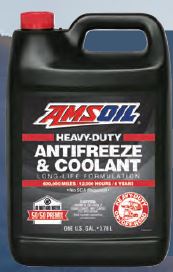AMSOIL UPPER CYLINDER LUBRICANT: I use it and it works! Now on the market for about a year: AMSOIL Upper Cylinder Lubricant (UCL) is the latest addition to the gasoline additive lineup. It delivers more lubricity than the competition and battles ethanol-related corrosion. Fuel Additive Product Overview Upper cylinders are one of the toughest areas […]
You are browsing archives for
Tag: amsoil
A Simple Way To Fight Cylinder-Liner Cav...
A SIMPLE WAY TO FIGHT CYLINDER-LINER CAVITATION In extreme cases, cylinder-liner cavitation in diesels can allow oil and coolant to mix. Then it’s just a matter of time until engine failure. Here’s what you can do to help ensure that doesn’t happen. Most diesel engines are designed with replaceable cast-iron cylinder liners that are pressed […]
5W-30 Viscosity Joins Synthetic Small-En...
For your Winter Tools – Snowblowers – New 5W30 Small Engine Oil. Just ask for the White Cap Snowblower Oil!! Available Oct. 1, new Commercial Grade 5W-30 Synthetic Small-Engine Oil (AES) rounds out the synthetic small-engine oil family. It’s recommended primarily for snowblowers and generators, bringing the excellent benefits of AMSOIL Synthetic 5W-30 Small Engine […]
2019 AMSOIL Year in Review: Product & Co
2019 Year in Review: AMSOIL Company News Jamie Gibson|Dec 20, 2019 9:58 AM Editor Note: – This is being posted late but that’s alright as AMSOIL’s year starts now in August when things really get started for us – Summer maintenance and in northern climates not far is the season to wrap things up for […]



